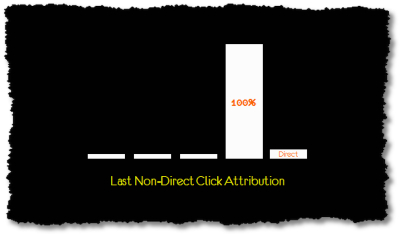Is Digital Advertising A Bubble That’s Going To Pop?
I know a way to make your PPC ads out-of-this-world effective. Just make sure you show them to people that are going to buy anyway! 🙂
In this recent blog post, it was suggested that online advertising is a bubble, and that sooner or later people are going to figure out that all the money they’re spending on it is really just going to show ads to people that were going to buy anyway. By its title – the new dot com bubble is here: its called online advertising – puts forth the assertion that the amount of dollars invested in digital advertising will tank one day because advertisers will start realizing that most of their budgets are wasted. Why are they being wasted?
They used one (yes, one) example, albeit a big one, that had to do with eBay. It’s outlined in the article, so I won’t go into it deeply here. But basically, eBay’s sales didn’t change when they turned off their Search advertising campaigns. Why? Almost all of the sales were coming from people who searched “ebay” and then clicked through to the site. The point? Those people would have found the top organic ranking as a way to navigate to the site if the ad hadn’t been there to click. eBay was spending $20m per year on customers they would have gotten anyway.
Because of this one (yes, one) example, the authors conclude that digital ads are “utterly pointless.”
Attribution is the real problem
PPC influencer Kirk Williams (@PPCKirk) was moved enough by the assertions in the article that he decided to write a response. Essentially, Kirk said that he agreed there is a major problem with how digital ad dollars are allocated, but that the actual problem isn’t with digital advertising itself, but with how its value is sub-optimally measured (attribution) and the strategies that result.
From the eBay example…it’s not that Search advertising is utterly pointless. The problem was with the way eBay’s account managers were assigning value to Search advertising. It’s likely, given what was said, that 100% of the value of a sale to a person that searched “ebay” on a search engine and purchased was being given to that channel and keyword. It’s like giving your wedding day 100% of the credit for your relationship with your spouse. What about the day you met? Your first date? The day you worked through your first fight?
What the managers of eBay’s marketing mix weren’t thinking of was how much value was remotely appropriate to assign to that channel and those keywords. When you mess up attribution, you, in turn, mess up the story of what’s actually driving results; as well as how you allocate budget to that mix. If they at least got in the ballpark of what the value of a click on the keyword ebay was, they would have never spent $20m a year on it and maybe not gotten fired.
Every customer journey is different
But it goes further than that. Kirk takes it to the next step and doesn’t just suggest that we mess up attribution, but that you can’t really get attribution right because it will always have limitations. Not only can you not track everything, but there’s no way to know how much of an effect an advertisement has on someone who eventually converts. We just throw our best guesses out there hoping to get in the ballpark, but none of it is perfect. There are models that bring some semblance of rational to it (position-based, time decay, etc.), but they’re all not close to perfect.
With the marriage example, how much credit should the first date get for you getting married? The answer is it’s vastly different for everyone because every journey is different. Two people could have had a horrible first date and things just got better from there. Or maybe they had a great first date and it carried the relationship through the next couple bad dates until things turned around. Who knows. It’s different for everybody.
So the real bubble, Kirk says, isn’t digital advertising itself. It’s the attribution of digital advertising. It’s accepting and implementing sub-optimal digital marketing strategies – like throwing money at stuff you may not need to – and then trying to present the case as good marketing. Data is presented in a way that fabricates the reality of what’s going on.
No, spending all that money on the keyword ebay was not good digital advertising. But that doesn’t prove that Search marketing is “utterly pointless.” It just means the strategy they were using may have been utterly pointless.
Faulty conclusions & adjustments
Both articles allude to an issue when it comes to allocating capital. Amateurish digital marketing is doing simple analysis of what channels/campaigns/etc. are getting (sub-optimally) credited with conversions and value, and then shifting ad dollars accordingly. The problem with this is…if you’re not weighting value correctly, then you’re drawing faulty conclusions and making faulty adjustments. Both articles rightly suggest, in my experience, that too many account managers don’t account for this in their strategies.
Then it gets taken a step further as we start automating processes and have machines make the incorrect adjustments based on their faulty data inputs. It’s not the algorithms (or their creators) fault that we provide them with faulty inputs. If you’re going to work with machines, you have to understand how they work and how to best deploy them to be used effectively. (See the book Digital Marketing in an AI World)
If you tell a machine to just get the most sales at the best ROI it can, of course it will bid up on brand keywords and down on non-brand and top of funnel keywords. It doesn’t know where the customer is in their decision-making process. It’s just making decisions based on the data that’s input. If you attribute more conversion value to the last channel the customer touched (the wedding day) than you should, it’s going to give more weight to that channel than it should. And frankly, you really don’t know exactly how much value you should attribute to each touchpoint anyway, so let’s not pretend we do.
Adjust for reality
There are endless journeys and stories of how people turn into customers. It doesn’t fit into a nice little formula. Account managers have to understand the machines are going to work this way and adjust for that reality.
We have a saying in PPC…”it depends.” In my experience, far too many digital marketers don’t keep a fist-clenching grip on this concept as they work with businesses on their campaigns. They read that a certain setting, or a certain bid strategy, or a certain channel, or a certain whatever is right. They implement said tactic without giving much credence to whether the tactic is actually optimal for each specific business. This sounds like what happened with the eBay example. They read “you should do brand bidding to protect your brand and get cheap sales,” so that’s what they did.
As Kirk alludes to…we can’t let conversion data deceive us just because it’s available. It can be so deceptive that he even says…
In this regard, I would suggest that conversion tracking is as much of a curse as it is a blessing.
We have to be careful about the KPIs we choose for each campaign, the accuracy of our inputs and how the conversion data gets used. Having realistic expectations FOR the data, and realistic interpretations OF the data will help us actually do good advertising…which never has been and never will be a bubble.




